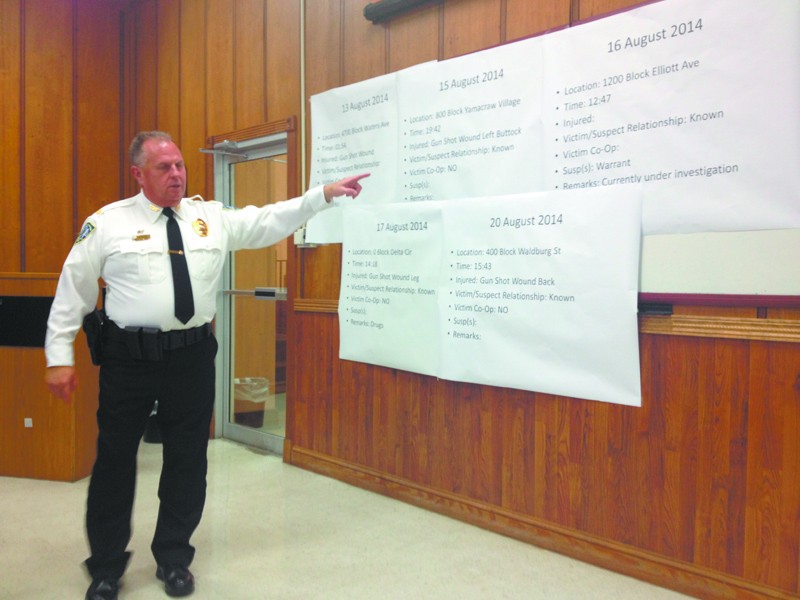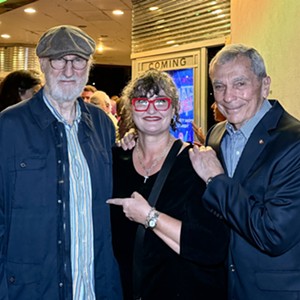One of President George W. Bush's old chiefs of staff, Andrew Card, once famously said of that administration's Iraq policy, "From a marketing point of view, you don't introduce new products in August."
So as a savage summer comes to a close, Savannah/Chatham Metro Police are finally showing public motion in a new direction, after a violent few months which frustrated citizen and officer alike.
The now-infamous string of 24 shootings in as many days has slowed to “only” five.
Out of all the shootings, only a handful of arrests have been made—mostly because in the vast majority of cases the young victims flatly refuse to cooperate with police.

As high-profile, high-revenue “Operation Thunder” roadblocks all summer seemed to the public to occupy more police attention than the shootings, Metro is responding to the criticism with some new initiatives.
However, as you’ll see, police are also plain that the new initiatives are short-term. They are clearly waiting on new and better permanent leadership to emerge, hopefully in the form of an incorruptible new police chief as the candidate search concludes to replace disgraced former chief Willie Lovett, now facing federal indictments.
How many times during Operation Thunder did you hear people say, “Why don’t they send all these cops to where all the crime is instead of just writing tickets?!”
The new “Quick Reaction Force” seems designed to address that complaint.
The team “principally concentrates in the Central Precinct where the majority of shootings have taken place, but can be assigned immediately anywhere in the jurisdiction,” explains Major Richard Zapal, longtime Metro veteran.
Unlike the already-established Crime Suppression Units, which are precinct-specific, the Quick Reaction Force is a single group of officers—working overtime, which is significant and which we’ll return to later —ready to move over and around precinct lines as needed under the watch commander to respond to hot spots.
Zapal says that as of last week, Quick Reaction officers “had completed 18 felony arrests, 11 misdemeanor arrests and three arrests on outstanding warrants.”
Zapal notes one success in particular, when undercover officers arrested four young men behind an apartment building in Feiler Park.
One suspect was putting on a mask and another had a handgun, presumably to settle a score. One arrestee was out on bail after an arrest in connection with a murder.
“Our officers actually prevented a shooting that day,” Zapal tells me. “Those guys were sitting there waiting for some other guys to show up. One guy pulls out a gun, racks a round and says ‘hey we’re going to do this.’”
Calling it “good old-fashioned police work,” Zapal says “we’re hitting areas where numbers are rising. We’re putting people out there who know what they’re looking for and know who they’re trying to identify.”
Speaking of old-fashioned police work, the day after publicizing the Quick Reaction Force, Metro PD called attention to its “Code Blue” initiative, intended to get more police out of cars and walking the streets.
“People want to see police in their neighborhoods,” says Zapal. “But they don’t want to see us just ride by. They want to see us walking and stopping and talking to people, so we can build a really good rapport with people in the neighborhood.”
Referring to the “Snitches Get Stitches” credo that hampers so much detective work in high-crime areas, Zapal says “When you’re on foot they’re willing to talk to you more. If we’re seen in the neighborhoods all the time then it’s not just when somebody’s telling the police what’s going on, because you’re always seen in the neighborhood talking and walking around.”
The move towards foot patrol would seem to echo a frequent complaint about modern police—that they simply spend way too much time in air-conditioned cars.
But don’t get too excited.
Zapal is plain that these are not extra patrols, but staff, often with desk jobs, donating a small amount of time a week to foot patrol wedged between other duties.
“It’s for staff who aren’t specifically assigned to a patrol beat—like detectives, my position, the chief, the assistant chief, all the majors. When we can go out and do work between meetings, we go out there and we do foot patrol. It’s a force multiplier.”
So to be clear: The new foot patrol literally involves asking staff who usually don’t wear a uniform to wear a uniform two days a week and find spare time to walk as little as 10-15 minutes out in the neighborhoods.
“Even if they only talk to one person, it’s worth it,” Zapal says.
Add this admittedly ad hoc nature of the foot patrol to the fact that the Quick Reaction Force comprises officers working overtime, and we see these “new initiatives” more as trial balloons or experiments.
It’s a fact that police don’t seem to be trying to hide. Indeed, Zapal is quoted in the press release on the Quick Reaction Force saying, “It’s too taxing on both personnel and city budgets to continue long-term. But we will continue it as long as we can.”
That line is clearly not in there by accident and to my mind is a not-so-subtle call to political leadership for more resources.
Whether that call will get a positive response is another story. Ironically, taxpayers are already buying Savannah/Chatham Police.... wait for it.... 91 brand new patrol cars, at a cost of about $3 million.
In some ways your police department seems to be trending in the right direction. In others, only time will tell if old habits can be changed.



























